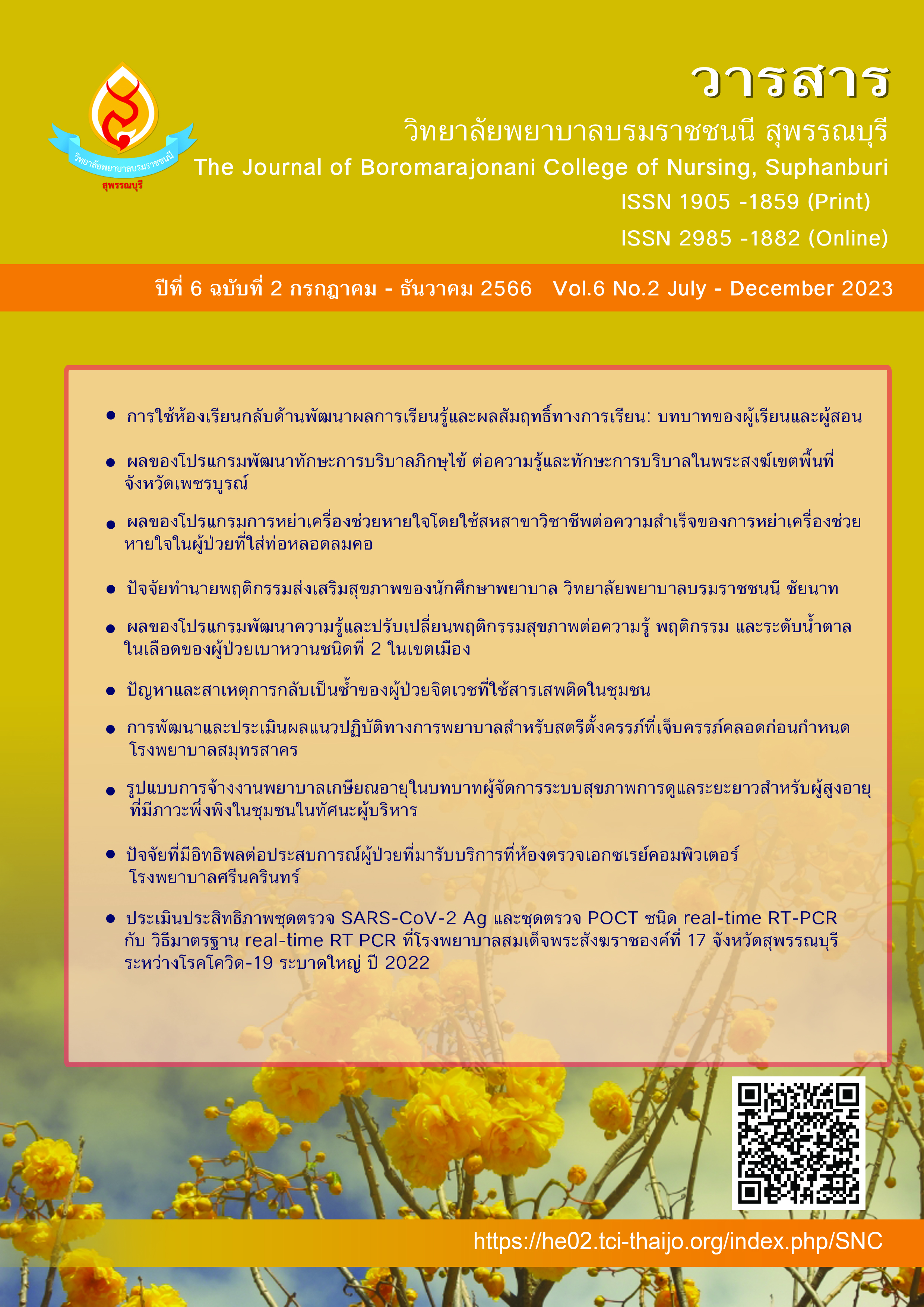การใช้ห้องเรียนกลับด้านพัฒนาผลการเรียนรู้และผลสัมฤทธิ์ทางการเรียน: บทบาทของผู้เรียนและผู้สอน
คำสำคัญ:
ห้องเรียนกลับด้าน , ผลการเรียนรู้, ผลสัมฤทธิ์ทางการเรียนบทคัดย่อ
การเรียนการสอนแบบห้องเรียนกลับด้านเป็นแนวทางการสอนที่ช่วยให้ผู้เรียนเกิดพฤติกรรมการเรียนรู้อันพึงประสงค์ ด้วยหลักการ 3 ขั้นตอน ได้แก่ 1) พิจารณาเลือกเทคโนโลยีที่เหมาะสมเพื่อใช้การเรียนรู้ผ่านอุปกรณ์สื่อสาร 2) ใช้ประโยชน์จากเทคโนโลยีในการสื่อสาร เพื่อตอบข้อสงสัย ตั้งคำถาม หรือแจ้งให้ผู้เรียนสืบค้นในเรื่องที่ต้องการ และ 3) ใช้เวลาในห้องเรียน ส่งเสริมความเข้าใจผ่านกิจกรรม การอภิปราย วิเคราะห์ วิพากษ์วิจารณ์ และอธิบายสาระสำคัญเพิ่มเติม ผู้สอนใช้องค์ประกอบ 4 ด้านหมุนเวียนเป็นระบบอย่างต่อเนื่อง คือ 1) การกำหนดยุทธวิธีเพิ่มพูนประสบการณ์ ครูผู้สอนเป็นผู้ชี้แนะวิธีการเรียนรู้ให้กับผู้เรียนผ่านเกม สถานการณ์จำลอง สื่อปฏิสัมพันธ์ การทดลอง หรือการวิจัย 2) การสืบค้นเพื่อให้เกิดมโนทัศน์รวบยอด ครูสนับสนุนส่งเสริมให้ผู้เรียนสืบค้นข้อมูลจากฐานข้อมูลที่ทันสมัยและน่าเชื่อถือ 3) การสร้างองค์ความรู้อย่างมีความหมาย ผู้เรียนเป็นผู้บูรณาการสร้างทักษะองค์ความรู้จากสื่อที่ได้รับจากการเรียนรู้ด้วยตนเองผ่านการสะท้อนคิดและการชี้แนะ และ 4) การสาธิตและประยุกต์ใช้ ผู้สอนสามารถสร้างสรรค์และส่งเสริมการเรียนรู้โดยใช้ความก้าวหน้าทางเทคโนโลยีตอบสนองกับผู้เรียนได้มากยิ่งขึ้น ประกอบกับการแพร่ระบาดของสถานการณ์โควิด-19 การเรียนรู้ห้องเรียนกลับด้านจะช่วยลดการเรียนในห้องเรียน ช่วยให้มีการเว้นระยะห่างทางสังคม ลดการรวมกลุ่ม และเพิ่มการพูดคุยกันผ่านทางสื่อออนไลน์มากขึ้น ช่วยพัฒนาทักษะและทัศนคติการเรียนรู้ด้วยตนเอง เกิดความพึงพอใจในการเรียน และพัฒนาผลลัพธ์การเรียนรู้และผลสัมฤทธิ์ทางการเรียนได้
เอกสารอ้างอิง
Barbour, C., & Schuessler, J. B. (2019). A preliminary framework to guide implementation of The Flipped Classroom Method in nursing education. Nurse Education in Practice, 34, 36-42.
Bergmann, J., & Sams, A. (2012). Flip your classroom: Reach every student in every class every day. Eugene, OR: International Society for Technology in Education.
Channgam, S., & Piriyasurawong, P. (2018). Learning model via a flipped classroom merge with augmented reality for analytical thinking skills of undergraduate students. Journal of Thonburi University, 12(29), 229-240. (In Thai)
Dehghanzadeh, S., & Jafaraghaee, F. (2018). Comparing the effects of traditional lecture and flipped classroom on nursing students' critical thinking disposition: A quasi-experimental study. Nurse Education Today, 71, 151-156. DOI: 10.1016/j.nedt.2018.09.027
El-Banna, M. M., Whitlow, M., & McNelis, A. M. (2017). Flipping around the classroom: Accelerated Bachelor of Science in Nursing students' satisfaction and achievement. Nurse Education Today, 56, 41-46.
Green, R. D., & Schlairet, M. C. (2017). Moving toward heutagogical learning: Illuminating undergraduate nursing students' experiences in a flipped classroom. Nurse Education Today, 49, 122-128.
Joseph, M. A., Roach, E. J., Natarajan, J., Karkada, S., & Cayaban, A. R. R. (2021). Flipped classroom improves Omani nursing students’ performance and satisfaction in anatomy and physiology. BMC Nursing, 20:1. https://doi.org/10.1186/s12912-020-00515-w.
Lai, H. M., Hsieh, P. J., Uden, L., & Yang, C. H. (2021). A multilevel investigation of factors influencing university students’ behavioral engagement in flipped classrooms. Computers & Education, 175, 104318.
Limvong, T., & Saengri, Y. (2019). Flipped Classroom: new learning for 21st Century Skills. Mahidol R2R e-Journal, 6(2), 9-17. (In Thai)
Murillo-Zamorano, L. R., López Sánchez, J. A., & Godoy-Caballero, A. L. (2019). How the flipped classroom affects knowledge, skills, and engagement in higher education: Effects on students' satisfaction. Computers & Education, 141, 103608. (18 pages).
Ohtake, P. J., Lyons, A., Glogowski, M., Stellrecht, E., Aronoff, N., Grabowski, J., et al. (2018). Using an interprofessional flipped classroom educational strategy for developing evidence-based practice knowledge and skills. Journal of Interprofessional Education & Practice, 11, 7-11.
Öz, G. Ö., & Abaan, S. (2021). Use of a flipped classroom “Leadership in Nursing” course on nursing students' achievement and experiences: A quasi-experimental study. Journal of Professional Nursing, 37(3), 562-571.
Riddle, E., Gier, E., & Williams, K. (2020). Utility of the Flipped Classroom When Teaching Clinical Nutrition Material. Journal of the Academy of Nutrition and Dietetics, 120(3), 351- 358.
Strelan, P., Osborn, A., & Palmer, E. (2020). The flipped classroom: A meta-analysis of effects on student performance across disciplines and education levels. Educational Research Review, 30, 100314. (22 pages).
Tan, C., Yue, W. G., & Fu, Y. (2017). Effectiveness of flipped classrooms in nursing education: Systematic review and meta-analysis. Chinese Nursing Research, 4, 192-200.
Tejangkura, L., & Chobarunsitti, C. (2023). Improving of Learning Outcomes for Nursing Students by Using Flipped Classrooms in Leadership and Clinical Nursing Management Subject. Proceeding the 5th Suan Dusit National Academic Conference 2023 "Innovation and Artificial Intelligence for Education in the Digital Age" at Raktakanit Building, Suan Dusit University, pp 548-556. (In Thai)
Thummakul, D., & Pongkiachai, R. (2022). Development of Learning Outcomes of Nursing Students by using the Flipped Classroom in Research and Innovation Subject. Princess of Naradhiwas University Journal, Science, 14(2): 193-214. (In Thai)
Tsai, M. N., Liao, Y. F., Chang, Y. L., & Chen, H. C. (2020). A brainstorming flipped classroom approach for improving students’ learning performance, motivation, teacher-student interaction and creativity in a civics education class. Thinking Skills and Creativity, 38, 100747.
Xu, P., Chen, Y., Nie, W., Wang, Y., Song, T., Li H., et al. (2019). The effectiveness of a flipped classroom on the development of Chinese nursing students' skill competence: A systematic review and meta-analysis. Nurse Education Today, 80, 67-77.
Yonwilad, W. (2020). Effect of Flipped Classroom on Learning Achievement and Instructional Satisfaction of Mathematics Students in Mathematical Analysis Courses. Journal of Curriculum and Instruction, Sakon Nakhon Rajabhat University, 12(33), 115-122. (In Thai)
Zhu, L., Lian, Z., & Engström, M. (2020). Use of a flipped classroom in ophthalmology courses for nursing, dental and medical students: A quasi-experimental study using a mixed-methods approach. Nurse Education Today, 85, 104262. (8 pages).
ดาวน์โหลด
เผยแพร่แล้ว
ฉบับ
ประเภทบทความ
สัญญาอนุญาต
ลิขสิทธิ์ (c) 2023 วิทยาลัยพยาบาลบรมราชชนนี สุพรรณบุรี

อนุญาตภายใต้เงื่อนไข Creative Commons Attribution-NonCommercial-NoDerivatives 4.0 International License.
บทความที่ได้รับการตีพิมพ์เป็นลิขสิทธิ์ของวารสารวิทยาลัยพยาบาลบรมราชชนนี สุพรรณบุรี
ข้อความที่ปรากฏในบทความแต่ละเรื่องในวารสารวิชาการเล่มนี้เป็นความคิดเห็นส่วนตัวของผู้เขียนแต่ละท่านไม่เกี่ยวข้องกับวิทยาลัยพยาบาลบรมราชชนนี สุพรรณบุรี และคณาจารย์ท่านอื่นๆในวิทยาลัยฯ แต่อย่างใด ความรับผิดชอบองค์ประกอบทั้งหมดของบทความแต่ละเรื่องเป็นของผู้เขียนแต่ละท่าน หากมีความผิดพลาดใดๆ ผู้เขียนแต่ละท่านจะรับผิดชอบบทความของตนเองแต่ผู้เดียว



